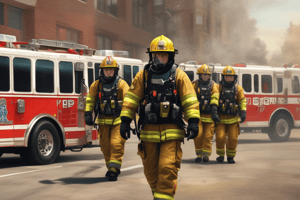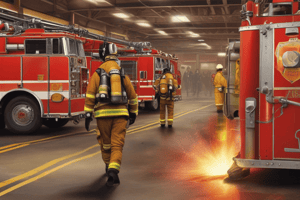Podcast
Questions and Answers
As a general guideline, how large should a safety zone be?
As a general guideline, how large should a safety zone be?
At a distance of 4 times the flame height.
If you are at the decision point in the risk management process, when can you proceed?
If you are at the decision point in the risk management process, when can you proceed?
After you have developed controls.
How do you describe targets for bucket drops?
How do you describe targets for bucket drops?
General location, identify flight hazards, describe target.
Where can you find burn injury treatments?
Where can you find burn injury treatments?
When working with multiple resources and overhead, a single resource can effectively manage all tasks.
When working with multiple resources and overhead, a single resource can effectively manage all tasks.
What are the 3 types of communication?
What are the 3 types of communication?
What is the downhill checklist?
What is the downhill checklist?
Define LCES.
Define LCES.
What are 5 items you should receive during a briefing prior to a tactical assignment?
What are 5 items you should receive during a briefing prior to a tactical assignment?
What are the human factors that contribute to poor communications?
What are the human factors that contribute to poor communications?
What are the components of a leader's intent?
What are the components of a leader's intent?
Where could you find the difference between a fire weather watch and a fire weather warning?
Where could you find the difference between a fire weather watch and a fire weather warning?
What is the safest type of attack to work in whenever possible?
What is the safest type of attack to work in whenever possible?
What are the elements of the risk management process?
What are the elements of the risk management process?
What is the responsibility of a lookout?
What is the responsibility of a lookout?
When using minimum impact construction tactics, you can still construct a fireline.
When using minimum impact construction tactics, you can still construct a fireline.
What are the touchdown pads and safety circles for Type 2 Helicopters?
What are the touchdown pads and safety circles for Type 2 Helicopters?
How many shifts should you be prepared to spend on the fireline?
How many shifts should you be prepared to spend on the fireline?
What are the objectives in conducting an AAR?
What are the objectives in conducting an AAR?
Flashcards are hidden until you start studying
Study Notes
Safety Zones and Guidelines
- Safety zones should be at least four times the height of flames to ensure adequate protection.
Risk Management Process
- Proceed past the decision point only after developing and implementing adequate controls.
Target Descriptions for Bucket Drops
- Targets should include general location details, identification of flight hazards, and a clear description of the target area.
Burn Injury Treatments
- Treatments for burn injuries can be located in the IRPG, specifically on page 111.
Communication in Firefighting
- Three main types of communication include oral, visual, and written methods.
Downhill Checklist
- This checklist involves considerations for structure size up, site conditions, LCES (Lookouts, Communications, Escape Routes, Safety Zones), and tactical measures for rapid mitigation.
Understanding LCES
- LCES stands for Lookouts, Communications, Escape Routes, and Safety Zones, essential for maintaining safety in wildfire situations.
Briefing Essentials
- Briefings prior to tactical assignments should cover situation updates, mission objectives, communication methods, service updates, and risk management information.
Human Factors Affecting Communication
- Poor communication can stem from inexperience, distractions, fatigue, stress, and negative attitudes.
Leader's Intent Components
- Essential components of a leader's intent include the task at hand, the purpose of the action, and the desired end state.
Fire Weather Information
- The distinction between a fire weather watch and a fire weather warning is available in the IRPG, found on page 67.
Attack Methodology
- Whenever possible, a direct attack is considered the safest method for tackling fires.
Risk Management Process Elements
- The risk management process involves identifying hazards, assessing their significance, developing controls, implementing these controls, supervising, and evaluating the outcomes.
Lookout Responsibilities
- A lookout must know crew locations, escape routes, safety zones, and trigger points for necessary actions.
Minimum Impact Tactics
- It is possible to construct a fireline while adhering to minimum impact construction tactics.
Helicopter Safety Specifications
- For Type 2 Helicopters, the safety circle spans 90 feet, while touchdown pads measure 20 feet by 20 feet.
Fireline Shift Preparedness
- Be prepared to operate on the fireline for at least 2-3 shifts, ensuring adequate endurance and support.
After Action Review (AAR) Objectives
- Conducting an AAR aims to identify both strengths and weaknesses, facilitating learning and improvement for future operations.
Studying That Suits You
Use AI to generate personalized quizzes and flashcards to suit your learning preferences.




